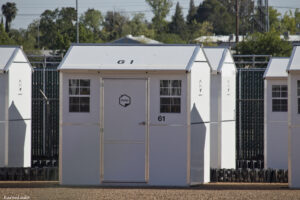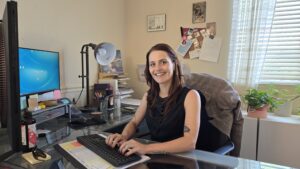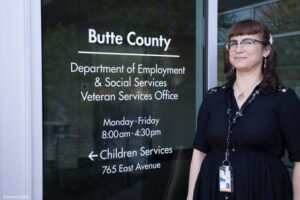by Natalie Hanson
posted July 1
Daniel Reinhard, a Butte County social worker, regularly visits unhoused people at Genesis, a pallet shelter village in Chico.

Each week, he talks to people who are either renewing their Medi-Cal, California’s version of Medicaid, or need help accessing expanded Medi-Cal services. In January 2024, Medi-Cal, which already served one-third of all Californians, expanded services to all state residents who qualify regardless of immigration status, as well as to people already enrolled.
“The reason I go out to the shelter to talk to people [is] so they have that option to do everything the old-fashioned way,” Reinhard said. “You tend to run into people in that situation who don’t like to go into the county services building. Some of it is just transportation. Some people don’t like doing it online.”
On the bright side, Reinhard said, the state’s efforts to improve online access have helped people sort through what was once a deeply confusing process.
Nearly one year since California officials announced Medi-Cal recipients must renew their coverage to keep it, social workers in rural counties — like Reinhard — are working to reach at-risk communities.
Medicaid recipients typically confirm their qualifications every year to stay on their state health care plan in a process called “redetermination.” However, the federal government paused redetermination for several years during the COVID-19 pandemic, resuming it in April 2023. Medi-Cal launched a year-long redetermination outreach campaign that ended in June 2024.
State and county public health officials have continued to scramble to bridge challenges to accessing these new services — challenges that have been particularly great in more rural areas like Butte County that have many unhoused people.
Ken MacKell, an assistant director at the Butte County Department of Employment & Social Services (DESS), told ChicoSol that it takes different kinds of outreach work to make sure that all recipients are located. Every person’s renewal deadline depends upon which month the state opened their case.
People tend to apply when they make a low enough yearly income to qualify or don’t have employment-based insurance, MacKell also pointed out. “If the economy gets worse, our numbers tend to increase and people come in more.”
Chico’s True North Housing Alliance runs several programs, including the Torres Community Shelter that provides shelter beds and services to unhoused people. True North staff helps clients enroll in Medi-Cal or connect with advocates to help them access new benefits.

True North Executive Director Taylor Bunch credits CalAIM, the state’s recent program to transform Medi-Cal services to reach people in their homes and communities. CalAIM, passed in 2021 under Gov. Gavin Newsom, is designed to connect people directly with enhanced management in high-risk cases like extreme substance abuse disorder.
“About 70% of shelter attendees are Medi-Cal beneficiaries, but nearly 100% are Medi-Cal eligible,” Bunch said. “Most unhoused people have limited to no incomes.”
However, True North staffers often face statewide challenges that are exacerbated in rural areas, such as a lack of reliable Internet and phone access. That’s particularly troublesome for people who are unemployed or have complex medical needs.
Butte County’s access problem
Butte County also has limited medical providers and long wait lists, particularly for specialists. Some providers have different contracts covering reimbursement for some services and not others, which has limited Medi-Cal coverage for many people, Bunch added.
To address the ongoing access problem, True North is seeking funding for a new project: Chico’s first navigation center, designed to help people quickly connect with different services in one place.
Bunch noted that True North already has a local grant for the project and private donations, but is seeking to raise about $1.3 million to finish what would be a 4,000 square-foot expansion on the existing Torres Shelter parcel.
“If you lose access to a medical provider, then maybe there could be a telehealth option. But if you don’t have access to broadband or reliable Internet service, how can you get that?” Bunch said.
Given those challenges, Bunch hopes that a navigation center could start to fill those gaps, while the state works to improve other access options for the most vulnerable.
The struggle to help people access those services while living in historically marginalized areas remains a daily concern for case workers in Butte County.
Maria Gonzalez-Krueger, an eligibility specialist with the county, said that as she works with unhoused people in Chico at Torres Shelter and elderly adults at the senior living complex Creekside Place to determine their eligibility for Medi-Cal, clients continue to have questions about the services they qualify for.

Many older adults may qualify for both Medi-Cal and Medicare, the federal program for people with disabilities and those aged 65 and over. While Medicare covers only 80% of all health care expenses, Medi-Cal can often cover the rest. However, many local doctors only accept Medicare.
“We can’t tell them what to do, and we can’t give them advice because we don’t know their medical history,” she explained. “It’s difficult for people that age being in a rural area. The access to specialists and certain doctors is more limited than what someone would have access to in a larger city.”
Many unhoused people tend to only seek help when they need emergency care, and most often need help determining which doctors can help them with physicals and dental care, Gonzalez-Krueger said.
“Sometimes we do come across people who do see a doctor that doesn’t accept Medi-Cal and they didn’t know, and unfortunately they’re stuck with that bill,” she added. “And a lot of the time, people won’t sign up until there’s an emergency.”
Rural communities require creative solutions
State officials say that it will take creative options from organizations statewide like True North to fit the needs of every unique community.
Pamela Riley, chief health equity officer and assistant deputy director for Quality and Population Health Management at the state’s Department of Health Care Services, summed up the goal in a June 18 panel, convened by Ethnic Media Services: “We need all of you as part of the mix.”
“We need to understand how to meet people in the languages they are best served, and we have a lot more to do in engaging different segments of your population and people all over the state,” she continued.
Although California reached its lowest uninsured rate in 2022, access barriers to timely, quality, and equitable health care are still widespread — resulting in health disparities for underserved communities, particularly low-income individuals and people of color.
MacKell, the DESS assistant director in Butte, praised the state’s work during the pandemic to make it simpler to apply for services online or by phone with a case worker, rather than having to make trips to the county offices. This greatly reduces the time spent on paperwork and office processes for people.
That’s particularly important now — as the state works to expand eligibility and access and to meet ambitious goals that would eliminate disparities. Case workers like Reinhard and Gonzalez-Krueger are on the frontline of the rural California effort.
This story was supported by a fellowship funded through the Department of Health Care Services (DHCS) to increase awareness of initiatives that are expanding health care services.
Natalie Hanson is a contributing editor to ChicoSol.

Thank you to the featured case workers and others who are on the frontline of helping community members.